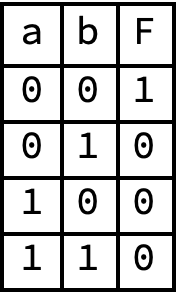Consider an expression with two binary variables, $a,b\in\left\{ 0,1\right\} $, given by $F=(1-a-b)^{3}(1-b)$, with truth table:
{a,b}={0,0} -> F=1
{a,b}={0,1} -> F=0
{a,b}={1,0} -> F=0
{a,b}={1,1} -> F=0
A simpler way of writing this would be $F=G=(1-a-b)(1-b)$, which can be seen to produce the same truth table. However, if I try to do this with the following Mathematica input
FullSimplify[(1-a-b)^3 (1-b), {a, b} ∈ {0, 1}]
it doesn't do the trick. How can we do this in general and for more complicated expressions with more than 2 variables? I looked into this question but it doesn't seem to be dealing with the same problem I'm presenting here.

